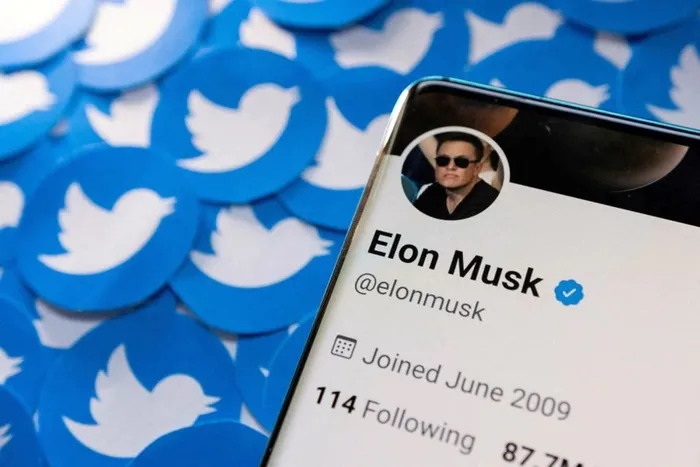Sorry, Elon Musk. You don't have the formula to end the Ukraine war

Elon Musk's Twitter profile is seen on a smartphone placed on printed Twitter logos. File picture: Reuters/Dado Ruvic/Illustration
ELON Musk has had wondrous success in building electric vehicles and launching rockets. But just because you're the world's richest person doesn't mean you can solve every problem in the world.
Musk proved that with his sophomoric tweet on Monday afternoon laying out his own personal peace plan for Ukraine:
"Redo elections of annexed regions under UN supervision. Russia leaves if that is will of the people."
"Crimea formally part of Russia, as it has been since 1783 (until Khrushchev's mistake)."
"Water supply to Crimea assured."
"Ukraine remains neutral."
There is so much ignorance and delusion to unpack here that it will keep Twitter busy for days to come. Indeed, both Ukraine's president and foreign minister have already weighed in with tweets objecting to Musk's facile attempt to give away part of their country. It is hard to top the reaction of a parody account: "Elon Musk weighing in on Russia/Ukraine since he is an expert in failed takeover attempts."
At the risk of feeding Musk's insatiable love for attention - which is, ultimately, what this is all about - it is worth pointing out that what he proposes is neither practical nor moral. Russia invaded Ukraine and under international law is not allowed to hold referendums on which country Ukrainians would like to be part of, whether the election is supervised by the United Nations or not. That would be like Putin invading Alaska and demanding a referendum on whether Alaskans would like to be part of Russia again.
Given how many people have been either killed or deported in the regions that Russia occupies, it is not clear who would even constitute the electorate: Would Ukrainians who have fled the Russian onslaught be allowed to vote? Ukrainians have already made clear their preference: More than 90 percent voted for independence in 1991 and well more than 90 percent support the war effort today. We don't need a referendum to know which county Ukrainians would like to be part of: They are showing it by fighting for their freedom at great cost.
Oddly enough, given how much Musk is doing to aid Ukraine with his Starlink satellite terminals, his half-baked tweet shows the insidious influence of Russian propaganda. Was it, indeed, a mistake for Soviet leader Nikita Khrushchev to transfer Crimea, once a part of the Russian Empire, to the Ukrainian Soviet Socialist Republic in 1954? That's certainly what Russian dictator Vladimir Putin thinks, but even in 1991, a majority of Crimeans voted to be part of an independent Ukraine. Admittedly, support for independence was much lower in Crimea (54 percent) than in the rest of the country because of the large number of ethnic Russians, but that referendum had infinitely more legitimacy than the sham vote that Putin staged in 2014 to justify his annexation of Crimea. The European Union and the United States do not recognise Russia's annexation of Crimea - why should Musk?
As for the final part of the Musk peace plan: Ukraine has always been neutral, insofar as Nato would not accept it as a member. That did not prevent Putin from invading it in 2014 or again in 2022. Why would a Ukrainian commitment to neutrality prevent further Russian aggression in the future? In March, Kyiv actually offered to stay neutral if it would bring peace - but it didn't work.
I am only scratching the surface, of course, of the problems with Musk's proposal, which ignores the fact that Putin just annexed four regions of Ukraine where his troops are rapidly losing ground. On Friday, the Russian dictator said, "The people living in Luhansk and Donetsk, in Kherson and Zaporozhye have become our citizens, forever." What makes Musk think that Putin would go back on that pledge simply because the people of those regions voted to remain part of Ukraine? Putin has never respected the outcome of democracy in Russia, Ukraine, or anywhere else. (In fact, his Friday speech included a long-winded complaint about how awful democracy is.)
While Musk evidently knows little about Ukraine, I give him credit for good intentions: It is painful to watch the war grind on, at great cost to human life, and it is frightening to listen to Putin's threats to use nuclear weapons. This can lead to a natural impulse to try to "solve" the problem - to try to figure out some magical formula that would satisfy both sides and bring peace. But if that formula existed, it would already have been implemented.
War occurs when at least one side does not think that there is a peaceful way to redress its demands. In this case, there is a fundamental disagreement between Putin and the people of Ukraine: The Ukrainians think they are entitled to be an independent nation state with friendly relations with the West. Putin does not; as he has often made clear, he views Ukraine as a wayward province of Russia that needs to be reunited with the Motherland by force.
The war would end today if Putin would simply give up his imperial dreams. But until he does, the fighting will continue - and offering peace plans that cater to Putin's imaginary grievances does nothing to bring peace any closer.
* Max Boot is a Washington Post columnist and a senior fellow in national security studies at the Council on Foreign Relations.
** The views expessed here are not necessarily those of the DFA.
- THE WASHINGTON POST